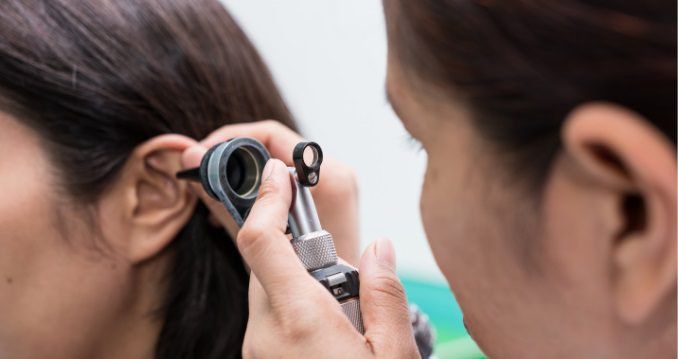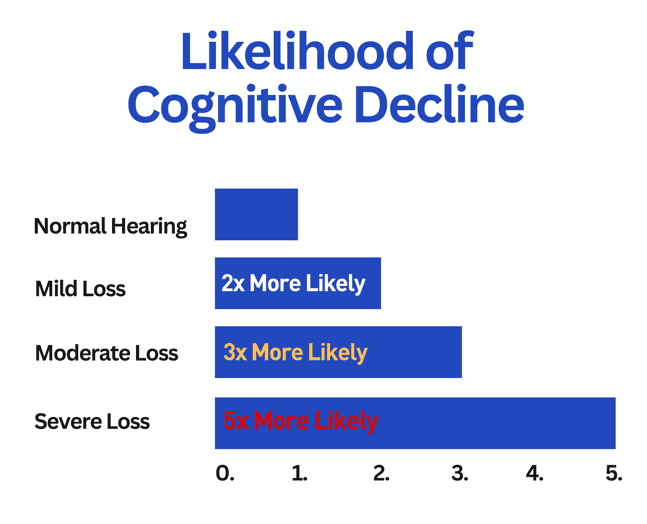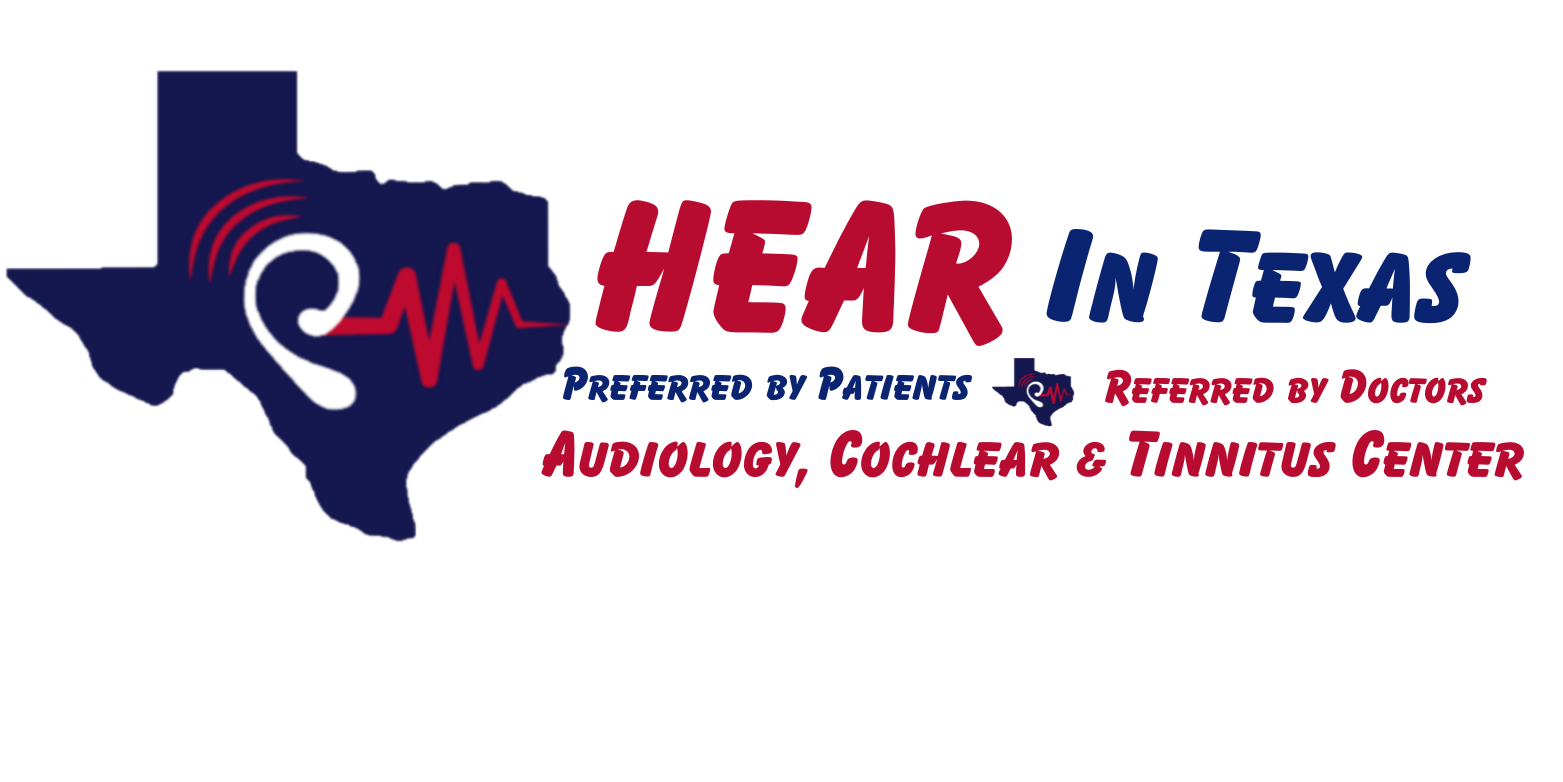HEAR IN TEXAS
Cognitive Screening
Cognitive Testing Allows For The Early Detection Of Decreased Cognitive Function

A decade-long study conducted by Dr. Frank Lin showed a five-fold increase in dementia for individuals with mild, medium, or severe hearing loss.
How the loss of sensory stimulation, compensation by your brain’s central processing system, and social isolation associated with hearing deterioration increase your risk for developing dementia is complex, but the link between the two conditions gives audiologists plenty of reasons for concern.
For Dr. Sally, that concern has led her to invest in cognitive screening using Cognivue testing in order to help hundreds of patients and their families live a richer, more independent lifestyle by combining our expertise with top-level technology for the early detection of cognitive decline.

The Link Between Hearing Loss And Cognitive Decline.
There are several theories about why hearing loss and cognitive decline go hand-in-hand. Four classifications established by the American Academy of Neurology identify the different reasons why hearing loss can lead to dementia.
01. Common Risk Factors
The largest common risk factors are age combined with high blood pressure, heart disease, and/or diabetes, which often accompany hearing loss. The narrowing of blood vessels, which impacts the network of small blood vessels feeding the cochlea, is common with these conditions.
02. Mental Overload
When hearing loss is left untreated, the central auditory pathways become overloaded with the increasingly difficult task of conducting, analyzing, and processing sound signals. Other parts of the brain, like those involved in thinking and memory, pitch in order to compensate, redirecting resources used for those purposes to help with hearing rather than cognitive functions.
03. Structural Changes
As sound stimulation from hearing loss declines, areas of the brain used for sound processing begin to atrophy or shrink.
04. Social Isolation
Many people experiencing hearing loss begin to avoid social events or avoid social gatherings due to the stress and discomfort of struggling to keep up with conversations in noisy settings. University of British Columbia researchers report that for every 10-decibel drop in hearing, there is a subsequent increase in social isolation by 52%.
What Is Cognitive Screening, And Why Is It Important?
A University of Bordeaux study published in 2018 identified a significant connection between self-reported hearing loss and dementia. The study showed that the cases of disabilities, dementia, and depression among elderly men with elevated hearing loss continued to increase, but those using hearing aids or with no diagnosed hearing impairment saw little to no cognitive decline.
This study supports our concern that a failure to address hearing has a significant impact on cognitive decline and puts our patients at risk for early-onset dementia. Hear in Texas includes cognitive testing using ClarityTM by Cognivue as one of our services in order to help our patients identify and manage cognitive decline as well as for developing the right hearing care plan and hearing aid selection.
How Does Cognitive Screening Work?

Cognivue provides a personalized, consistent, and reliable assessment of your overall brain health. The test establishes a baseline score against which you and your doctor can monitor and detect cognitive changes as they develop.
Features of Cognivue include:
• Quick assessment (about 10 minutes)
• Non-invasive
• Interactive and intuitive
• Self-administered
• Immediate results after testing
• Easy to understand results
• Secure and confidential
These FDA approved tests eliminate testing variability and inaccuracy through a unique software algorithm designed to use patient responses in order to adapt the test to the patient’s performance.
What Cognitive Screening Results Show
Cognitive testing results provide an outline for you and your doctor to evaluate the various conditions that contribute to cognitive decline, such as hearing loss, enabling you to establish a plan of action to limit continuing decline. Results from testing are separated into three different categories:
• Scores over 75 show normal cognitive function.
• Scores between 51 and 74 reveal some or low cognitive impairment requiring some minor interventions.
• Scores 50 and below indicate significant cognitive impairment for which you need to take urgent action to prevent further damage.
Helping You to Choose the Right Hearing Technology through our Partnerships with all Manufacturers
With each level of hearing loss and person that we help having their own unique set of circumstances, there is never a “one size fits all” approach.
That’s why we partner with every hearing aid manufacturer to ensure that we can always find the right solution for your unique needs.
This also means that we’re often front of the queue to get our hands on the latest hearing technology to ensure that you always have access to the latest developments.

Schedule A Cognitive Screening At Hear in Texas
Many of the patients we see in our clinic have put off addressing their hearing loss for some time, which could mean that they are beginning to experience some degree of cognitive decline by the time we conduct our hearing assessment.
As a part of our commitment to our patients and the New Braunfels community, Hear in Texas offers cognitive screening in order to identify and head off cognitive decline and dementia.
If you, or a loved one, is struggling with recall, making decisions, organizing tasks, losing your sense of direction or other issues related to cognitive decline, especially if you’re also experiencing hearing loss, contact us to schedule cognitive screening by submitting the adjacent form.
The Connection between Cognitive Decline and Hearing Loss | New Study
At Hear in Texas, we are committed to providing our patients with the latest information and research on hearing loss and cognitive decline.That’s why we were excited to hear about a recent study conducted by JAMA Neurology that aimed to determine the impact of hearing aids and cochlear implants on cognitive decline in individuals with a hearing loss.
The study, which included 31 studies with 137,484 participants from various regions, found that the use of hearing aids was associated with a 19% reduction in long-term cognitive decline. Additionally, even patients who already had mild cognitive impairment (“early dementia”) benefitted from the use of hearing aids, as they also had approximately a 20% lower risk of progressing to dementia.
These findings suggest that it is never too late to start using hearing aids, but early treatment may help to preserve the most cognition.
At Hear in Texas, we understand the importance of cognitive function and how it relates to hearing loss. That’s why we offer not only traditional hearing tests but also cognitive assessments such as Cognivue.
This quick and easy test can be taken in our office or at home and assesses cognitive function in areas such as memory, attention, and processing speed, providing a more comprehensive understanding of an individual’s cognitive abilities.
If you are concerned about cognitive decline and want to schedule a Cognivue assessment, please reach out to Hear in Texas today. Our dedicated team of hearing professionals will be happy to assist you in finding the right solutions to improve your hearing and cognitive function.
Don’t let hearing loss impact your overall health and well-being. Schedule an appointment with Hear in Texas today.

Hearing Health Resources
Latest News

How Hear in Texas Supports Veterans With Hearing Loss
New Blog Post DescriptionHonoring Veterans With Accessible Hearing Care At Hear in Texas, we hold a deep appreciation for the sacrifices that veterans have made for our country. As a veteran-owned bus... ...more
Hearing Loss ,Patient Resources &Veterans
June 24, 2025•3 min read

Four Ways to Optimize Your Hearing in 2025
Your hearing health is a cornerstone of your overall well-being. Staying informed about the latest advancements in audiology can help you make empowered decisions about your hearing care. Optimizing... ...more
Patient Resources ,Hearing Aids
May 05, 2025•3 min read
© Copyright 2025 Hear in Texas. All Rights Reserved. Designed by Topline




